REDEEMING TIME
COWLEY PUBLICATIONS is a ministry of the brothers of the Society of Saint John the Evangelist, a monastic order in the Episcopal Church. Our mission is to provide books and resources for those seeking spiritual and theological formation. COWLEY PUBLICATIONS is committed to developing a new generation of writers and teachers who will encourage people to think and pray in new ways about spirituality, reconciliation, and the future.
Redeeming Time
T. S. ELIOTS FOUR QUARTETS
Kenneth Paul Kramer

Published by Cowley Publications
An imprint of Rowman & Littlefield Publishers, Inc.
A wholly owned subsidiary of The Rowman & Littlefield Publishing Group, Inc.
4501 Forbes Boulevard, Suite 200
Lanham, MD 20706
Estover Road
Plymouth PL6 7PY
United Kingdom
Distributed by National Book Network
2007 Kenneth Paul Kramer
All rights reserved.
Published in the United States of America by Cowley Publications, a division of the Society of Saint John the Evangelist. No portion of this book may be reproduced, stored in or introduced into a retrieval system, or transmitted, in any form or by any meansincluding photocopyingwithout the prior written permission of Cowley Publications, except in the case of brief quotations embedded in critical articles and reviews.
Excerpts from Burnt Norton FOUR QUARTETS by T.S. Eliot, copyright 1936 by Harcourt, Inc. and renewed 1964 by T.S. Eliot, reprinted by permission of the publisher.
Excerpts from East Coker in FOUR QUARTETS, copyright 1940 by T.S. Eliot and renewed 1968 by Esme Valerie Eliot, reprinted by permission of Harcourt, Inc.
Excerpts from The Dry Salvages in FOUR QUARTETS, copyright 1941 by T.S. Eliot and renewed 1969 by Esme Valerie Eliot, reprinted by permission of Harcourt, Inc.
Excerpts from Little Gidding in FOUR QUARTETS, copyright 1942 by T.S. Eliot and renewed 1970 by Esme Valerie Eliot, reprinted by permission of Harcourt, Inc.
Library of Congress Cataloging-in-Publication Data:
Kramer, Kenneth
Redeeming time : T. S. Eliots Four quartets / Kenneth Paul Kramer.
p. cm.
Includes bibliographical references and index.
ISBN-13: 978-1-56101-285-5 ISBN-10:1-56101-285-8 (pbk. : alk. paper)
1. Eliot, T. S. (Thomas Stearns), 18881965. Four quartets. I. Title.
PS3509.L43F647 2007
821'.912dc22
2006019340
Scripture quotations are taken from the New Revised Standard Version of the Bible, 1989, by the Division of Christian Education of the National Council of the Churches of Christ in the United States of America. Used by permission.
Cover design: Zan Ceeley, Trio Bookworks
Cover photo: Houghton Library, catalog no. *AC9.El464.Zzx Box 2.
Used by permission of the Houghton Library, Harvard University.
Interior photos: Kenneth Paul Kramer
Interior design: Wendy Holdman
Printed in the United States of America.
 The paper used in this publication meets the minimum requirements of American National Standard for Information SciencesPermanence of Paper for Printed Library Materials, ANSI/NISO Z39.48-1992.
The paper used in this publication meets the minimum requirements of American National Standard for Information SciencesPermanence of Paper for Printed Library Materials, ANSI/NISO Z39.48-1992.
In Loving Memory of
Rose Meredith Tracey Kramer
The single Rose
Is now the Garden
Contents
Abbreviations
BN | Burnt Norton |
CPP | Complete Poems and Plays |
DS | The Dry Salvages |
EC | East Coker |
LG | Little Gidding |
Preface
Although Thomas Stearns Eliot (born 1888, St. Louis; died 1965, London) was born in the nineteenth century and wrote and published poetry in the years spanning the two world wars of the twentieth century, his work continues to attract readers in the new century, perhaps because of the unsettling power of his flashing phrases and the memorable music of his thought as it reaches beyond words. Who can forget a first encounter with J. Alfred Prufrock in The Love Song of J. Alfred Prufrock?
Let us go then, you and I,
When the evening is spread out against the sky
Like a patient etherized upon a table. (CPP 3)
I was immediately grasped and amazed by the man who measured out [his] life with coffee spoons and by the undiminished freshness and audacity of his overwhelming question Do I dare / Disturb the universe? I still recall an undergraduate professors highlighting the lines I should have been a pair of ragged claws / Scuttling across the floors of silent seas. As I imagine it must be for many of Eliots readers, I was captured by the unmistakable eloquence of these images and felt myself drawn to engage the poetry.
Sometime later, as a graduate student, I had As if in response to Prufrocks question, the poet of Four Quartets wrote:
We shall not cease from exploration
And the end of all our exploring
Will be to arrive where we started
And know the place for the first time. (LG V)
Then, when I submitted my dissertation at Temple University on Eliots Four Quartets, I thought that I understood the poem in a way that would serve me for many years. This thought, as I continue to study the poem, has proven remarkably nave.
From my early encounters with Eliot, this book has evolved intermittently over thirty-five years. The road that led to its publication has been marked by a full range of experiences, including the anxiety of almost losing a version of the manuscript in a fire; the echo again and again in my mind with startling clarity.
What continued drawing me to Eliots Quartets as I matured in my reading of them was the intellectual and spiritual nourishment that can be derived from engaging Eliots meditation on four secluded, spirit-charged landscapes. Moving between lyrical and prosaic speech, the poem takes place in four literal and metaphorical worlds: Burnt Norton place indicated in its title, and each landscape, as the poet describes it, portrays the interior gazes of an individual soul in pursuit of the highest spiritual mysteries.
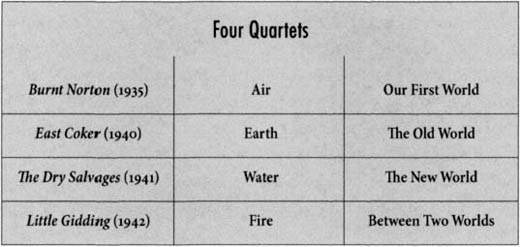
The books thesis is both provocative and practical. Four Quartets contemplates, through idea and word, how timeless momentsof redeeming reciprocity, of graced consciousnessshine through physical landscapes and release the poet from temporal enchainments. In meditating on these landscapes, the poet discovers that spiritual substance cannot be found fully in himself or in the totality of his experiences. Rather, it emerges from unsought, unforeseen moments of redeeming reciprocity (divine-human mutual contact) that interrupt time briefly in places entered by chance, and that are then retrieved and appropriated through an interplay of detached memory and disciplined imagination. In Four Quartets, therefore, a continual back and forth movement occurs between ordinary timea field of relentless distractions, struggle, and toiland redeeming timea graced elevation of ordinary consciousness arising from a genuinely mutual, giving-and-receiving engagement between poet and world that generates inner freedom from the practical desire and release from action and suffering (BN II).
Two interrelated key termsgrace and redemptionreappear
Four types of redeeming reciprocities converge throughout Eliots
Next page

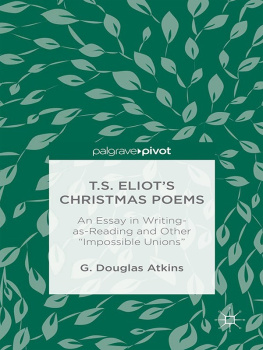
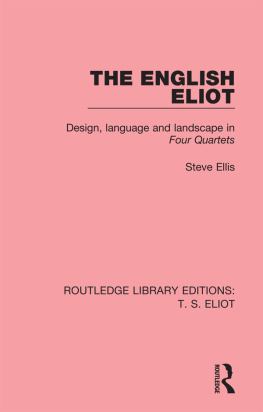
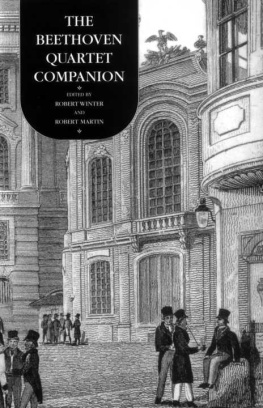

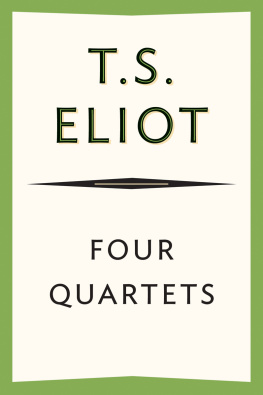
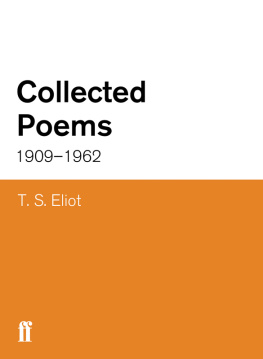
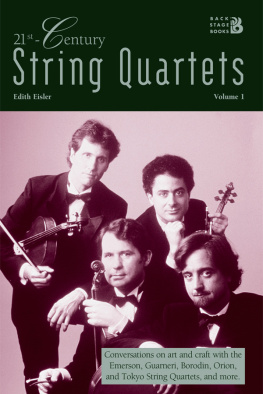

 The paper used in this publication meets the minimum requirements of American National Standard for Information SciencesPermanence of Paper for Printed Library Materials, ANSI/NISO Z39.48-1992.
The paper used in this publication meets the minimum requirements of American National Standard for Information SciencesPermanence of Paper for Printed Library Materials, ANSI/NISO Z39.48-1992.